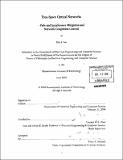Free-space optical networks : fade and interference mitigation and network congestion control
Author(s)
Lee, Etty J. (Etty Joanne)
DownloadFull printable version (38.91Mb)
Alternative title
FSO networks : fade and interference mitigation and network congestion control
Fade and interference mitigation and network congestion control
Other Contributors
Massachusetts Institute of Technology. Dept. of Electrical Engineering and Computer Science.
Advisor
Vincent W.S. Chan.
Terms of use
Metadata
Show full item recordAbstract
Optical communication through the atmospheric channel is commonly known as free-space optical (FSO) communication. When communicating through a clear FSO channel, not only is there atmospheric turbulence which results in fading of the received signal, but there may also be interference that scatters into the receiver and deteriorates performance. In this thesis, we consider mitigating the fading and interference with diversity coherent and diversity incoherent detection. We derive the performance of diversity coherent and diversity incoherent receivers in the presence of fading and various worst case interference types. Diversity coherent detection provides significant power gain over diversity direct detection, and most of the benefit can be achieved with a moderate amount of diversity. Moreover, diversity always improves the performance of coherent detection, whereas diversity improves the performance of direct detection only until an optimal diversity value, beyond which it degrades the performance. We also derive the improvement in expected outage length with diversity, and quantify the amount of interference that the system can handle while still achieving a given outage probability. Although signal fades or 'outages' in an FSO link can be mitigated on the Physical Layer, they cannot be completely eliminated. In a free-space optical network, these outages affect the performance and design of the Transport Layer. The effect of outages on the TCP sender is to diminish its throughput significantly due to drastic reduction of its rate when its packets do not get received through the outage. We consider a class of TCP-based protocols that is better suited for free-space optical networks. In particular, the protocols in this class have the sender distinguish whether a packet loss is due to an outage or congestion and not reduce its rate if the loss was due to an outage. We analyze, using an approximate channel model for FSO links, the maximum performance that can be achieved by a sender in this class, and compare the performance against a TCP sender's performance. The protocols in this class can gain back the performance loss in TCP due to link outages and they are particularly beneficial when the path has FSO links with strong turbulence and large bandwidth-delay product. We discuss a possible way to implement the distinguishing of packet loss due to congestion from packet loss due to link outage.
Description
Thesis (Ph. D.)--Massachusetts Institute of Technology, Dept. of Electrical Engineering and Computer Science, 2010. Cataloged from PDF version of thesis. Includes bibliographical references (p. 337-341).
Date issued
2010Department
Massachusetts Institute of Technology. Department of Electrical Engineering and Computer SciencePublisher
Massachusetts Institute of Technology
Keywords
Electrical Engineering and Computer Science.